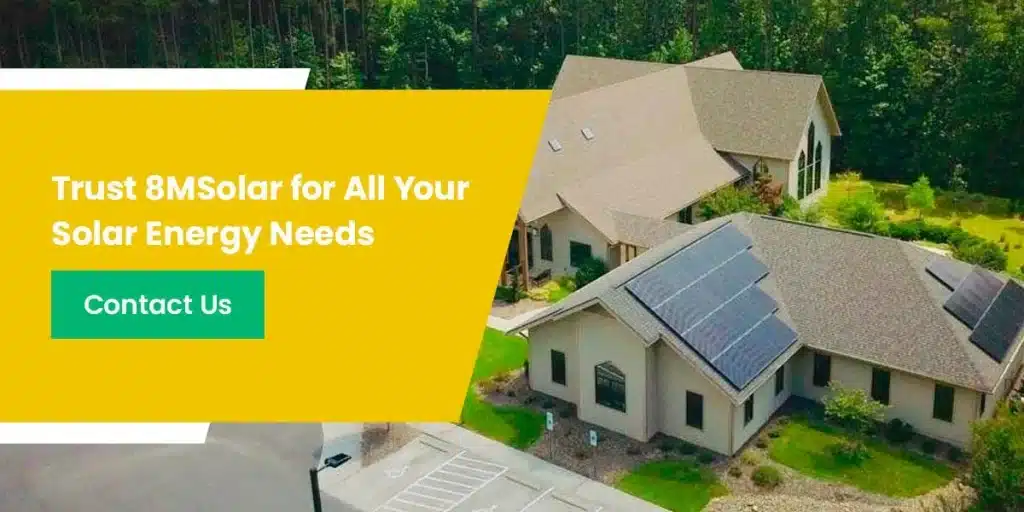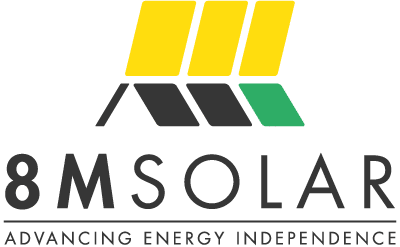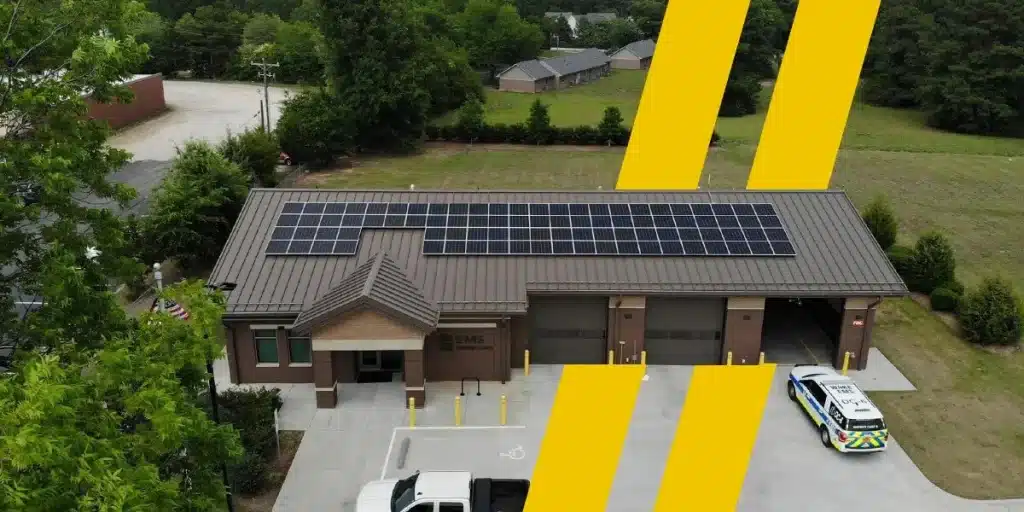
If you’ve decided to switch to solar energy, you can ask yourself one simple question to determine the size of your system: How much solar do I need? Determining this answer requires reflection on your end goal, whether that be: minimizing environmental contamination, increasing money savings, maximizing Return on Investment (ROI) or jumping onto the neighbor bandwagon.
How Much Power Does Your Home Currently Use?
The first step in determining how many solar panels are necessary on your property and how big a solar system you need is to calculate the current amount of kilowatt hours (kWhs) you use. A kWh is a measure of energy used over time that the utility uses to bill you. A six- to 12-month average of your household electricity bill is recommended to create a viable range. The “Kilowatt Hours (kWh) Used” portion of the bill is then broken down into hourly and daily usage.
Case Example
A homeowner’s electricity bill might read that a medium-sized home uses 4,800 kWh annually. You can use the kWh number to calculate your monthly average (4,800 kWh / 12 months) or a daily average of 13.15 kWh (4,800 kWh / 365 days per annual statement). This average can then be divided by 24 hours to determine how much electricity is used each hour of the day.
Using this calculation, you can determine how much energy you use, allowing you to budget what is necessary for your solar panels to produce hourly. You will not be alone in calculating this. 8MSolar’s power specialists will be there every step of the way to ensure 100% accuracy and maximization.
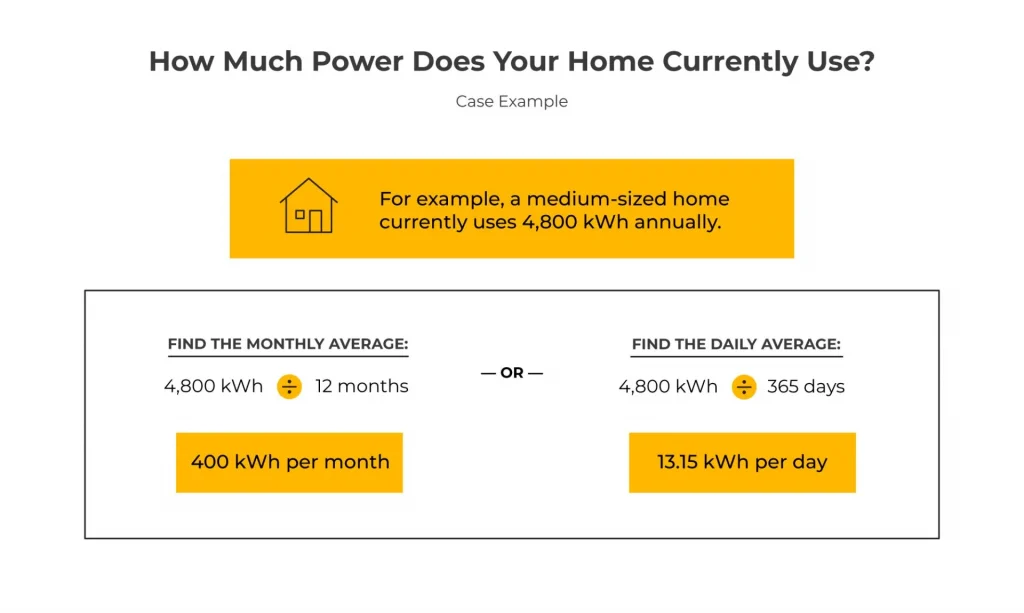
How Many Solar Panels Do You Need to Power Your Home?
Just like considering the many variables when buying your first home, accounting for key factors when budgeting how many solar panels to power a house will pay off in the long run with satisfaction and more dollars in your pocket. Since solar energy comes from the sun’s radiance, the number of direct sunlight hours and potential shade coverage are essential to consider. We look at these factors when designing a system.
Hours of Sunlight Exposure
Knowing how many hours of direct sunlight to expect per day at your home is crucial to how much anticipated energy your solar panels will produce. If you live in a very sunny location, such as Scottsdale, Arizona, you can expect more energy production per panel than in a cloudy state like Washington. Evaluating your peak sunlight hours will enable us to determine how many solar panels you need to maximize your cost savings based on your daily usage.
Case Example
Using the case example above as a reference, you will need 13.15 kWh daily for a home that consumes 4,800 kWh yearly to meet energy demands. This home is in New Mexico and receives around six hours of direct sunlight daily. Divide the average hourly energy consumption by peak sunlight hours to determine how much electricity your new solar system will need to produce daily to keep up with your current energy consumption.
Start by converting the average hourly usage from kWh to watts by multiplying 13.15 kWh by 1,000 W. Lastly, divide the converted 13,150 watts needed daily by the six hours of peak sunlight. Based on the available solar energy, this home’s panels in New Mexico will need 2,192 W.
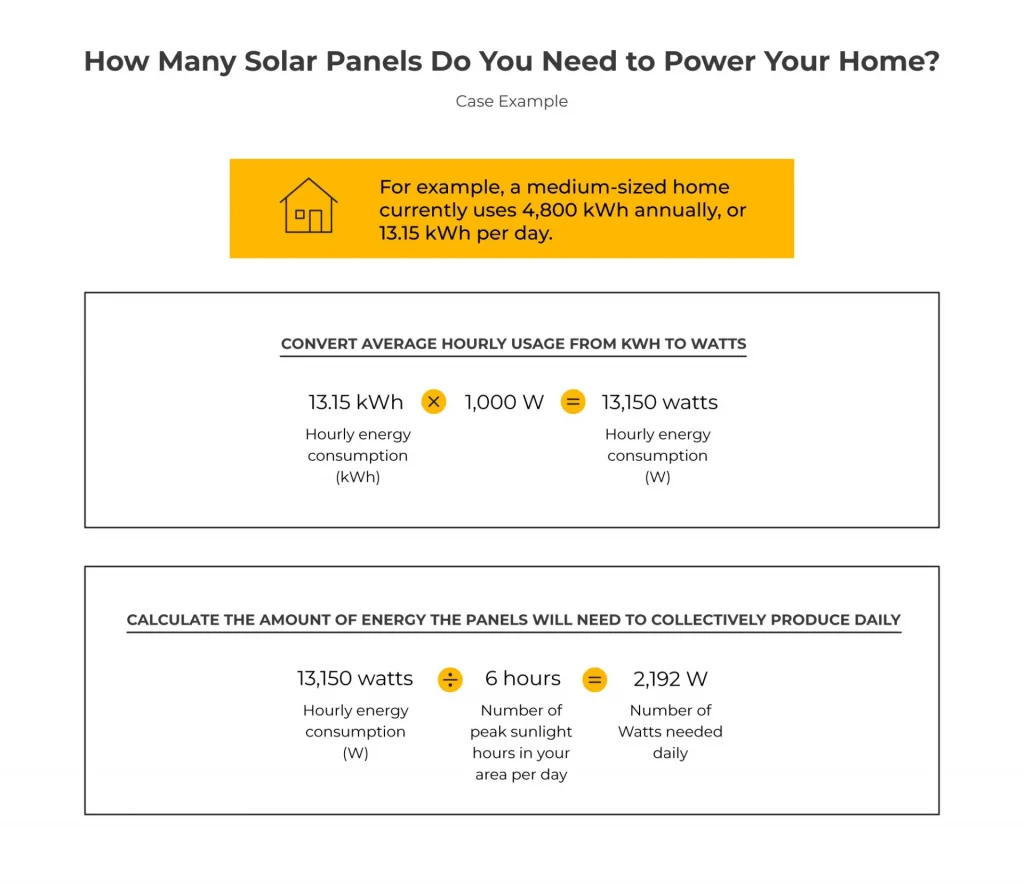
How Big of Solar System Do You Need to Maximize Space
Once we’ve determined the amount of energy we need the panels to output, we’ll begin designing your solar system to increase your ROI and optimize your visual appeal and sunlight access for your solar panel type.
Angle and Size of Roof
Simply put, not all roofs are created equal. If your roof is shaped oddly or is relatively small, consider the size and angle of the surface in determining the number of solar panels to acquire the necessary output. Roofs with lots of workable space can warrant sacrificing some efficiency by going with larger and more cost-effective panels to achieve the targeted energy.
Some homeowners simply don’t have enough roof space or some shade coverage for the solar panels in mind. If you don’t have enough roof space, you can choose high-efficiency panels that allow you to produce the most energy with the space available, all while saving more money in the long run.
The degree to which the roof slants will be critical in knowing how much sunlight is hitting the panels and just how much energy can be produced from each panel. We’ll help you determine what combination of panel sizes works, based on the angle and size of the roof, to get the most bang for your buck and curb appeal.
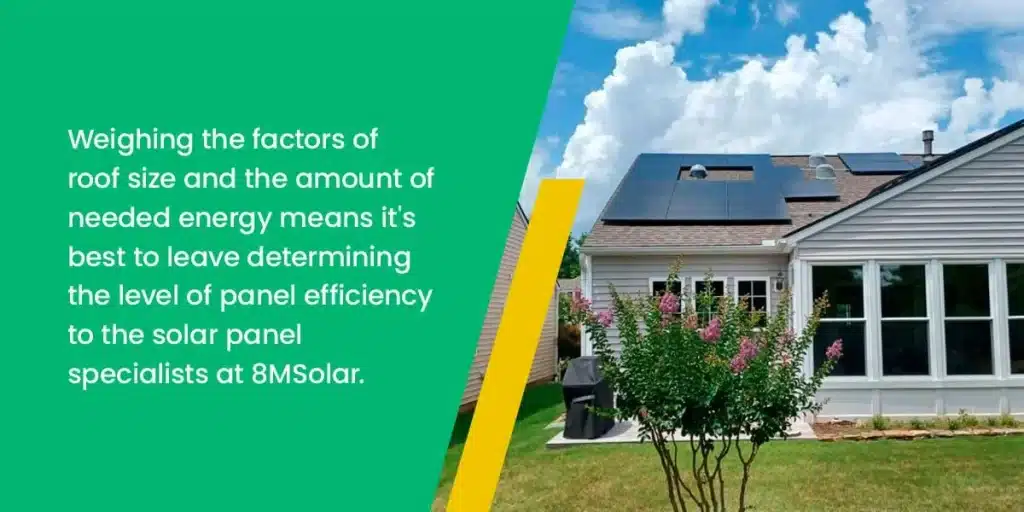
How Many Solar Panels Do You Need to Maximize Efficiency
Solar panels range in efficiency depending on the type of cell technology. A few of these options include conventional panels and solar panels with no grid lines. The latter of the two absorbs more sunlight, which increases the efficiency of sunlight conversion.
Weighing the factors of roof size and the amount of needed energy means it’s best to leave determining the level of panel efficiency to the solar panel specialists at 8MSolar. We ensure your budget and panels are maximized, including the visually appealing mounting options that keep the panels efficient and aesthetically pleasing on the backside of your roof.
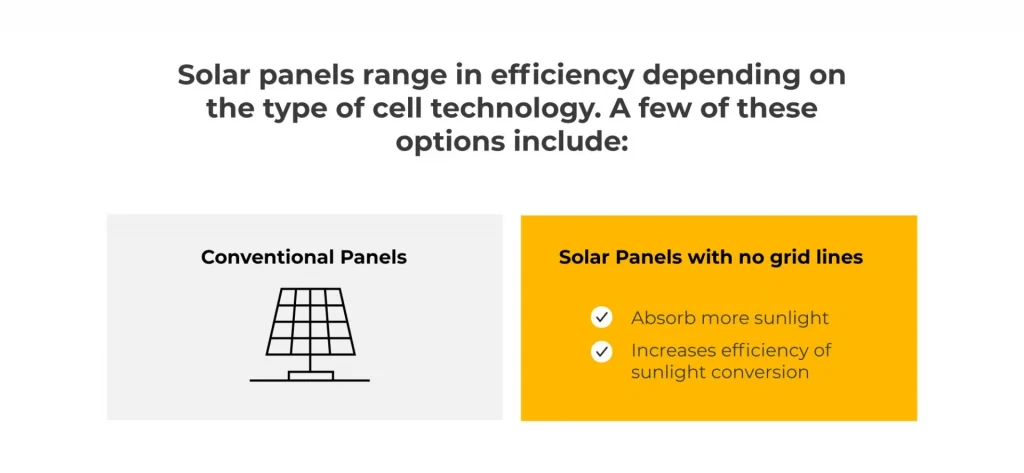
Factors That Impact the How Big Your Solar System Should Be
Apart from the aesthetic aspect, you’ll also need to consider the condition of your roof. An older roof or one that needs repairs may not be able to support the weight of too many panels, which could impact your overall efficiency. To install more panels, you may need to invest in roof repairs or replacements first.
Solar experts at 8MSolar can look at your roof and consult with your roof contractor to determine if any repairs or replacements are necessary for the number of panels you need, depending on weight and roof size. A quality roof will also ensure you won’t need to uninstall and reinstall your solar panels down the line to replace your roof in a few years.
The exact number of solar panels you need for maximum efficiency depends on a few additional factors apart from your roof size, condition and sunlight exposure, including:
- Home size: If you’re trying to offset your electrical costs using solar panels, you’ll need to consider the size of your home and the size of your roof. While roof considerations are essential for mounting the panels, varying home sizes will consume different amounts of energy. A smaller house will consume significantly less energy each month, meaning fewer panels can accommodate your energy needs. Owning a bigger home means you’ll need more panels to offset the costs, even if you have a smaller or slanted roof.
- Home appliances: Your appliances will add to your electrical needs, so you’ll need more panels to reach maximum efficiency. For example, having a hot tub or an electric vehicle will require more solar panels to meet your energy needs. You’ll want to consider your appliances and their energy efficiency to ensure you’ll have enough solar panels to at least break even on your solar energy production to power these appliances.
- Frequency of use: How often you use your appliances will also help determine how many solar panels you need. For example, if you travel a lot for work and are often out of the house, you may not need as many solar panels as someone who works from home. You’ll also want to account for any high-energy uses, such as a heated swimming pool, to ensure you install enough solar panels to accommodate your energy needs. You can also install a solar battery to store energy for future use.
Accounting for your various energy needs can help you install the correct amount of panels from the beginning. While you can add more panels in the future as your energy needs increase, sizing your system based on your expected purchases, such as an electric vehicle, is the most practical option.
Trust 8MSolar for All Your Solar Energy Needs
Making the leap from standard electricity to solar can be a difficult process if not done correctly. Rather than comparing panel types, calculating energy usage, and the other factors needed to maximize solar panel ROI on your own, consult with the professionals to achieve whatever energy goals you have set out for.
Here at 8MSolar, we make this transition a simple one for you by taking into account all of the many things: current home energy consumption, hours of direct sunlight, shade coverage, angle and size of the roof and panel efficiency to ultimately get the best Return on Investment. Get a free quote for residential solar panels and complimentary consultation today!
